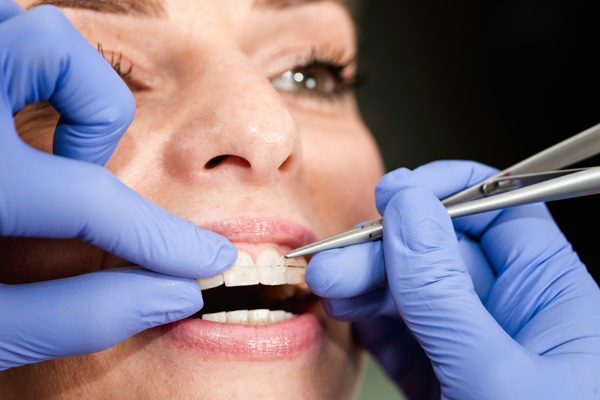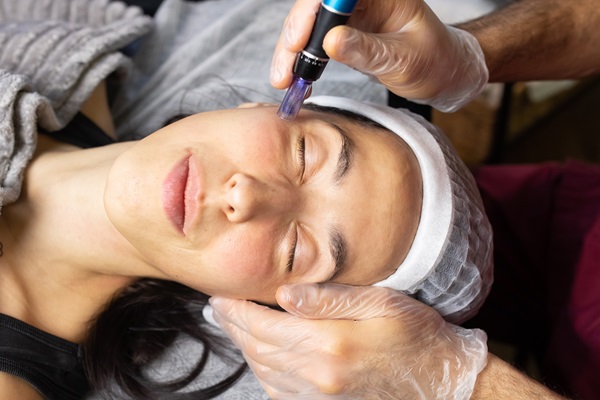Can a Cracked Tooth be Saved with a Root Canal and Crown Doral, FL
A cracked tooth is a serious problem that requires immediate attention. If not properly treated, it may have adverse effects on one’s health. Fortunately, root canals and crowns may help treat severe cases of cracked teeth.
Root canals and crowns are available at VidaDental: Kenia Cuevas, DDS in Doral and the surrounding area. We may be able to help save your cracked tooth. Call us today at (305) 230-4487 to schedule an appointment and learn more.
Symptoms of a Cracked Tooth
There are five kinds of cracked teeth: craze lines, fractured cusps, cracks extending into the gum line, split teeth, and vertical root fractures. Each type of cracked tooth shows different symptoms. Craze lines have tiny, painless cracks in the teeth enamel, and they typically do not require any treatment. Fractured cusps usually occur around dental fillings without affecting the tooth’s pulp, and they are generally painless. Usually, teeth with cracks that have reached the gum line require immediate extraction; however, they may still be salvageable if the crack has yet to reach the gum line.
Split teeth have cracks extending from the surface to below the gum line and can typically be separated into at least two segments. Such teeth generally cannot be saved as a whole. Teeth with vertical root fractures have cracks that begin from below the gum line and extend upwards. With all types of cracked teeth, patients may experience pain when chewing or biting, tooth sensitivity, swelling of the gum around the affected tooth, and intermittent pain.
“With all types of cracked teeth, patients may experience pain when chewing or biting, tooth sensitivity, swelling of the gum around the affected tooth, and intermittent pain.”
Cracked Tooth Syndrome (CTS)
Cracked tooth syndrome, abbreviated to CTS for short, is a condition in which a patient has a crack in their tooth that is too small to be seen on an X-ray. Alternatively, the patient’s tooth may have a crack that is difficult to locate due to it being under the gum. CTS most commonly affects molars, and its most common symptoms include tooth sensitivity and pain or discomfort when biting down. CTS pain is unlike cavity pain in that it is not persistent; instead, it comes and goes intermittently.
There is no singular cause of CTS. However, specific populations may be more prone to CTS than others. Patients with malocclusions that cause them to put excess pressure on one tooth, patients who grind or clench their teeth, patients with large fillings, or patients who have undergone root canal treatment are all more likely to have CTS than their counterparts. Furthermore, as CTS is also one of the most challenging dental problems to diagnose, patients may experience unexplained symptoms for months.
“…as CTS is also one of the most challenging dental problems to diagnose, patients may experience unexplained symptoms for months.”
Cracked Teeth & Root Canals
As stated by MedicalNewsToday, the best treatment method for a cracked tooth is dependent on its location and the extent of its damage. Some, like teeth with tiny cracks that do not cause any pain or discomfort, may be minor enough to not require treatment. Minor treatment options include glue, plastic resin (also known as bonding), fillings, or crowns. For more severe cases, root canal treatment may be necessary.
During a root canal procedure, the endodontist removes any infected or inflamed pulp. They then clean and shape the inside of the root canal before filling it. Afterward, a crown is placed on the tooth’s cap to protect and fully restore its functionality. Once restored, the treated tooth will continue to function as any other natural tooth.
“… the best treatment method for a cracked tooth is dependent on its location and the extent of its damage.”
Check out what others are saying about our dental services on Yelp: Can a Cracked Tooth be Saved with a Root Canal and Crown in Doral, FL
When a Cracked Tooth Is Beyond Repair
Cracked teeth that are not treated in time may eventually cause pulp necrosis, a condition in which the tissue inside the teeth dies. This may set off a domino effect of disastrous effects on one’s oral and overall health, including total teeth loss. Teeth may be totally beyond repair if the crack extends below the gum line. At that point, tooth extraction will become the only viable option.
Though today’s tooth replacement options are better than ever, it is still best to save a natural tooth whenever possible. Accordingly, patients should seek endodontic help as soon as they suspect they may have a cracked tooth. Early detection is critical for proper and effective treatment, and endodontic surgery may be adequate for more severe cases. VidaDental: Kenia Cuevas, DDS can help determine what is best for each patient on a case-by-case basis.
“Early detection is critical for proper and effective treatment, and endodontic surgery may be adequate for more severe cases.”
Questions Answered on This Page
Q. Am I at risk for cracked tooth syndrome (CTS)?
Q. How can a root canal help save my cracked tooth?
Q. What if a crown or root canal cannot save my cracked tooth?
Q. How can I make sure my repaired cracked tooth stays saved?
People Also Ask
Q. Is increased sensitivity to temperature a sign that endodontic surgery is necessary?
Q. What is the difference between endodontists and dentists?
Aftercare for a Repaired Cracked Tooth
Unlike in broken bones, the fractures in a cracked tooth will not heal. Some cracks may even continue to grow until they separate, leading to total tooth loss. Crowns protect the treated teeth, but even they are not foolproof. Fortunately, endodontic retreatment is possible if any treated teeth heal improperly or become reinfected due to external factors.
Knowing how to care for a repaired cracked tooth is arguably just as important as having it treated in the first place. With improper aftercare, patients may inadvertently worsen the pain and have the crack spread. Some pain or discomfort may follow most cracked tooth treatment options; however, this should be easily managed with painkillers (either prescribed or over-the-counter). VidaDental: Kenia Cuevas, DDS also provides patients with post-treatment instructions to ensure the best results.
“Knowing how to care for a repaired cracked tooth is arguably just as important as having it treated in the first place.”
Frequently Asked Questions
Q. Are cracked teeth considered dental emergencies?
A. Yes. Some cracked teeth are minor enough not to need treatment. However, only a professional can confirm when this is true. Endodontists are specialists who have a total understanding of how to diagnose and treat the tooth’s pulp. If you have a cracked tooth, call us immediately.
Q. Should I still call the endodontist if I hit my tooth, but I do not see any visible damage?
A. Yes. Invisible damage can be just as harmful as visible damage — sometimes even more. With invisible cracks, teeth may be more likely to break or get crushed in day-to-day activities.
Q. How can I prevent cracked teeth?
A. Do not chew on any hard foods or objects. If applicable, refrain from clenching or grinding the teeth. See a dental professional about this issue if necessary. A dentist can get you fitted for a mouthguard to wear during sleep or while playing contact sports.
Q. Why do cracked teeth hurt?
A. When the tooth’s outer hard tissues have cracked, this movement may irritate the pulp. Even simple acts like chewing may move the pieces. The crack may close when you release your bite, at which point you will feel a sharp, brief pain.
Q. Can my cracked tooth repair itself?
A. Yes, but this is very rare. This phenomenon tends to be isolated to teeth with minuscule cracks on the outer layers. The process is known as remineralization.
Quality Dental Services Can Transform Your Smile
By visiting us as soon as possible, our team can help get you the professional treatment you need. Instead of waiting around and allowing the symptoms to get worse, we can provide you with treatment options.
Definition of Dental Terminology
Helpful Related Links
- American Dental Association (ADA). Glossary of Dental Terms. 2021
- American Academy of Cosmetic Dentistry® (AACD). Home Page. 2021
- WebMD. WebMD’s Oral Care Guide. 2021
About our business, license, and website security
- VidaDental: Kenia Cuevas, DDS was established in 2009.
- We accept the following payment methods: American Express, Cash, Check, Discover, MasterCard, and Visa
- We serve patients from the following counties: Miami-Dade County
- We serve patients from the following cities: Doral, Sweetwater, Medley, Miami Springs and Miami
- FL (License #15387). View License Information and Specifics
- National Provider Identifier Database (1750571790). View NPI Registry Information
- Healthgrades. View Background Information and Reviews
- Norton Safe Web. View Details
- Trend Micro Site Safety Center. View Details








